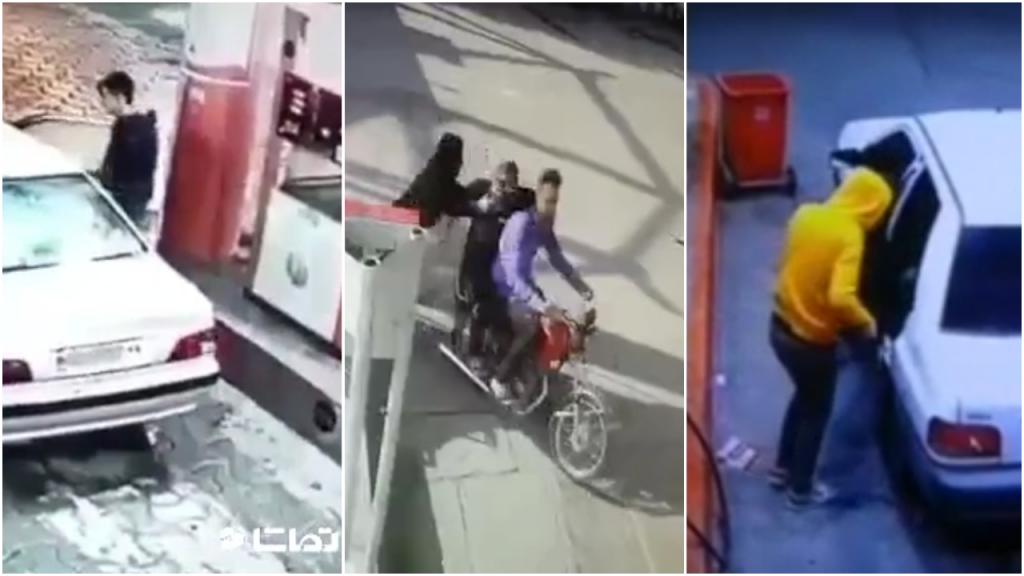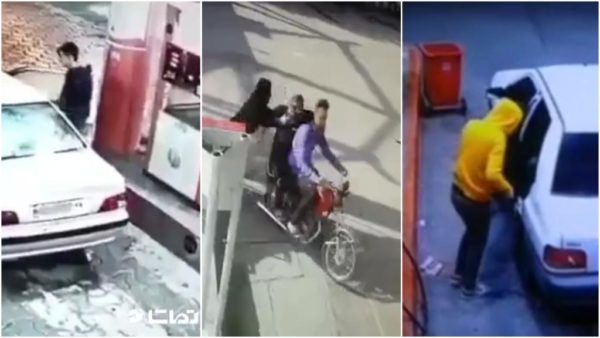Drivers fill up their cars with petrol and then drive away without paying… While petrol station attendents run after them, flinging stones at their vehicles. This has become a common sight in Iran, after the government implemented a hike in the price of petrol. On social media, Iranians are sharing videos of thefts caught on CCTV cameras around the country.

In November 2019, authorities in Iran increased the price of petrol by 200 per cent, triggering huge protests, which were violently put down by the government. More than 1,500 people died during those protests.
Since the new regulations, filling up a 40-litre petrol tank can cost as much as 120,000 tomans [around 9 euros], making it an unaffordable luxury in a country where most people earn the minimum wage or less, which is 1,500,000 tomans [around 100 euros].
A month after the sudden spike in prices, videos began circulating online showing the consequences of the government’s decision: drivers filling up their tanks and then trying to get away.
But workers at petrol stations aren’t having it. The videos also capture them running after the cars and throwing rocks at the vehicles; an act of revenge that could be expensive for the thieves. Repairing a broken car window could cost between 220,000 to 450,000 tomans [between 15 and 31 euros].
‘If there’s money missing from the till, the employee has to pay it out of his own pocket’
Our Observer Hossein [not his real name] is the owner of a petrol station in a town 150km from Tehran. He says that the thefts only started after the price increase.
“The owners of petrol stations aren’t insured for thefts. It’s the employee’s responsibility to stop them happening. At the end of the day, employees have to hand over the exact amount of money that is equivalent to the petrol they’ve sold. If money is missing, they have to make up the difference themselves.
So imagine if one driver does that every week in a petrol station. The petrol station worker, whose salary is around 1,500,000 to 1,800,000 tomans a month [103-124 euros], loses a quarter of their salary!
Throwing rocks at the rear windows of the cars might seem like a harsh retaliatory action, but it’s logical too. The employees do this to prevent the thefts from happening again and so stop them losing their own salary. If they didn’t do it, drivers would feel emboldened to come back and fill their tanks again and again.
The type of people who drive off without paying are usually young men between 20 and 30 years old, who drive in fairly standard middle class cars – not fancy new models, nor old bangers. For example, they’ll be in Peugeot 206 or Samands [a vehicle that is very common in Iran].
I couldn’t tell you exactly how often it happens. Some weeks it doesn’t happen at all, and then other weeks there will be three thefts in one week. Maybe it seems like a minor thing but it really affects the income of our workers. One thing I can say with absolute certainty is that it has become really common ever since the government increased the price of petrol. Before that it happened but only rarely.
The type of people who drive off without paying are usually young men between 20 and 30 years old, who drive in fairly standard middle class cars – not fancy new models, nor old bangers. For example, they’ll be in Peugeot 206 or Samands [a vehicle that is very common in Iran].
I couldn’t tell you exactly how often it happens. Some weeks it doesn’t happen at all, and then other weeks there will be three thefts in one week. Maybe it seems like a minor thing but it really affects the income of our workers. One thing I can say with absolute certainty is that it has become really common ever since the government increased the price of petrol. Before that it happened but only rarely.”
According to Iranian media, inflation has reached 41% a month since the petrol price hike. Even before the price rise, more than 55% of Iranians lived under the poverty line, earning less than 3,400,000 tomans [235 euros] a month.
FRANCE24


Leave a Reply
You must be logged in to post a comment.